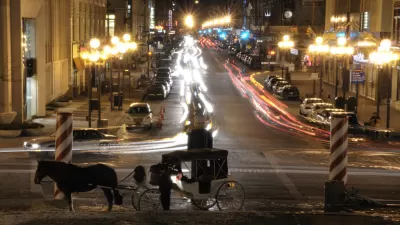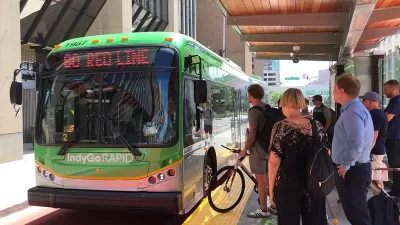Waiting for the funding to back up a transit plan can be brutal—especially when the calendar says February you thought you approved a transit-funding tax in the November election.

Voters and advocates in Indianapolis are learning that their vote to approve Question 2, a referendum to approve a transit-funding income tax, had a catch: it didn't actually approve a new law.
Despite earning 59.26 percent of the vote, writes Amber Stearns, "the ballot question in November was simply a way to gauge public support — to see if people would see a value in supporting mass transit in the form of a small income tax."
Now the task of passing the transit tax into law is up to the Indianapolis City Council, "and among the 25 city-county councilors there are a lot of mixed feelings about this proposal," reports Stearns.
At risk is a constant stream of revenue for IndyGo, and a transit plan that "includes a re-work of bus routes and frequency, a streamlined 7-day schedule for greater reliability and three rapid transit lines," writes Stearns. Planetizen Correspondent Irvin Dawid reported in detail on the unique structure of the income tax, and the political support that earned Question 2's approval, in an article from November.
The article by Stearns also offers an in-depth exploration of the politics at play as the tax heads to an expected vote in the City Council on February 27.
FULL STORY: City-County Council finds a difficult path to funding mass transit in Indy

Maui's Vacation Rental Debate Turns Ugly
Verbal attacks, misinformation campaigns and fistfights plague a high-stakes debate to convert thousands of vacation rentals into long-term housing.

Planetizen Federal Action Tracker
A weekly monitor of how Trump’s orders and actions are impacting planners and planning in America.

Chicago’s Ghost Rails
Just beneath the surface of the modern city lie the remnants of its expansive early 20th-century streetcar system.

Bend, Oregon Zoning Reforms Prioritize Small-Scale Housing
The city altered its zoning code to allow multi-family housing and eliminated parking mandates citywide.

Amtrak Cutting Jobs, Funding to High-Speed Rail
The agency plans to cut 10 percent of its workforce and has confirmed it will not fund new high-speed rail projects.

LA Denies Basic Services to Unhoused Residents
The city has repeatedly failed to respond to requests for trash pickup at encampment sites, and eliminated a program that provided mobile showers and toilets.
Urban Design for Planners 1: Software Tools
This six-course series explores essential urban design concepts using open source software and equips planners with the tools they need to participate fully in the urban design process.
Planning for Universal Design
Learn the tools for implementing Universal Design in planning regulations.
planning NEXT
Appalachian Highlands Housing Partners
Mpact (founded as Rail~Volution)
City of Camden Redevelopment Agency
City of Astoria
City of Portland
City of Laramie



























